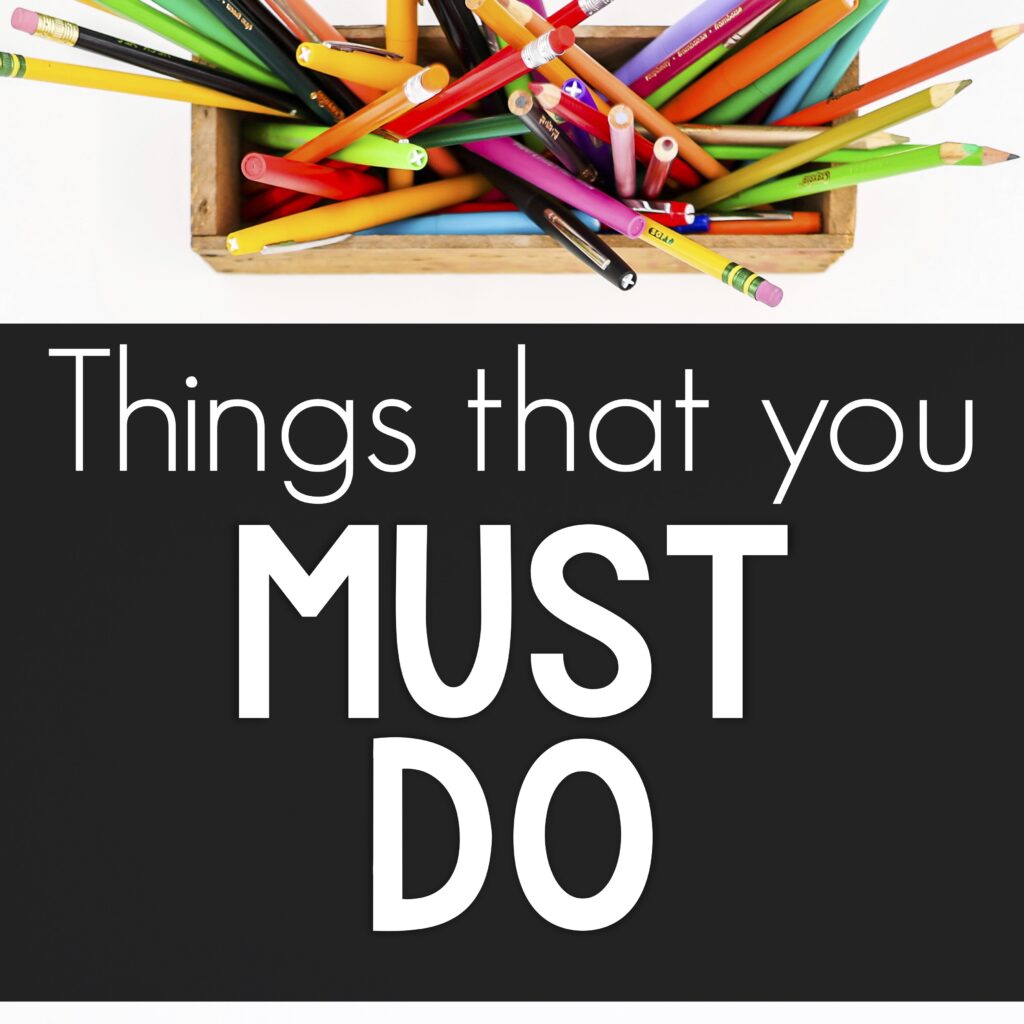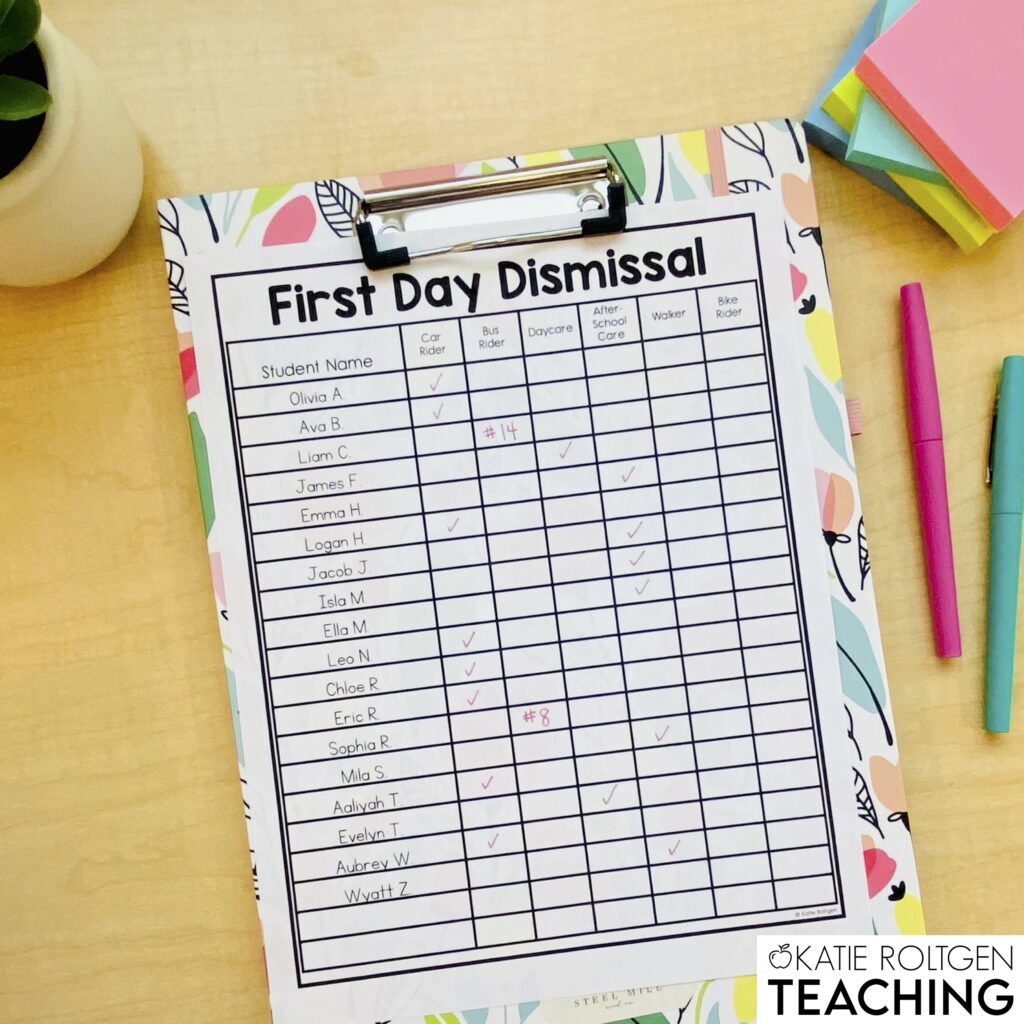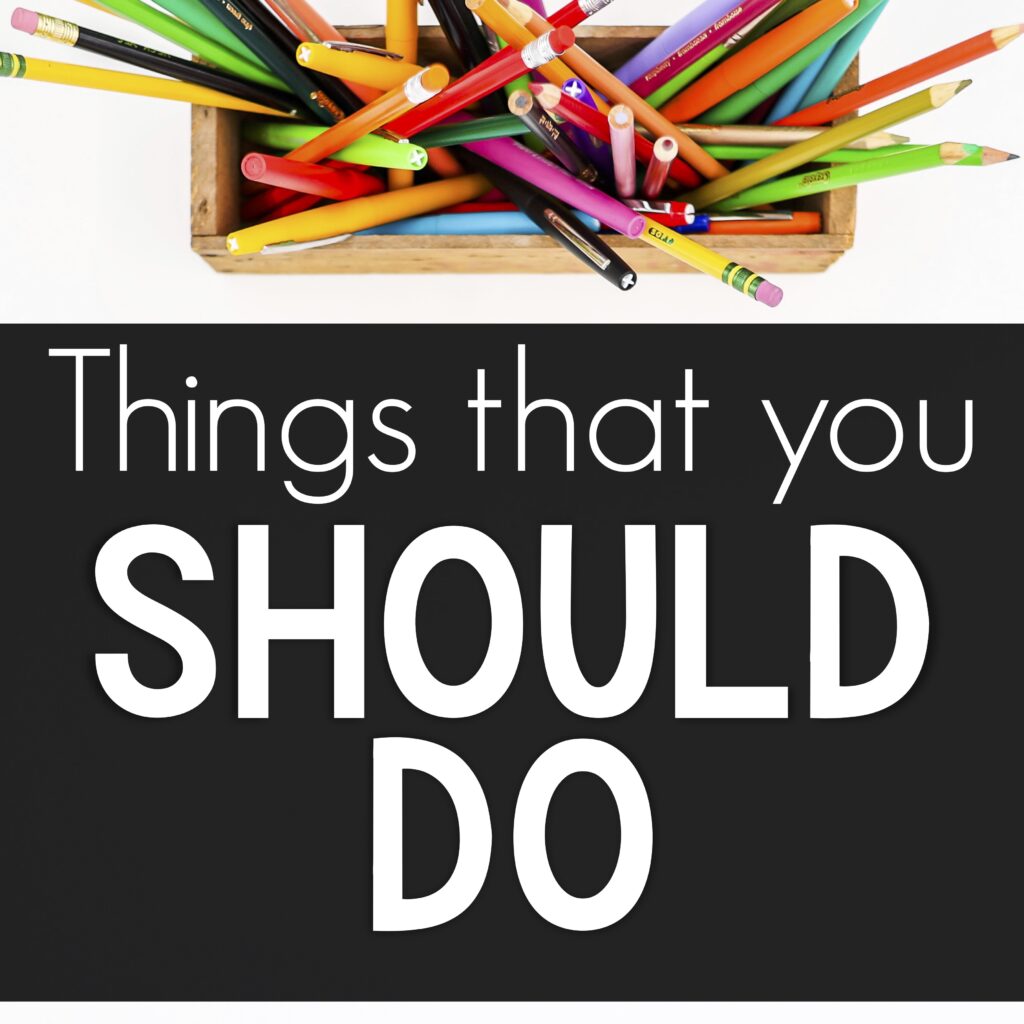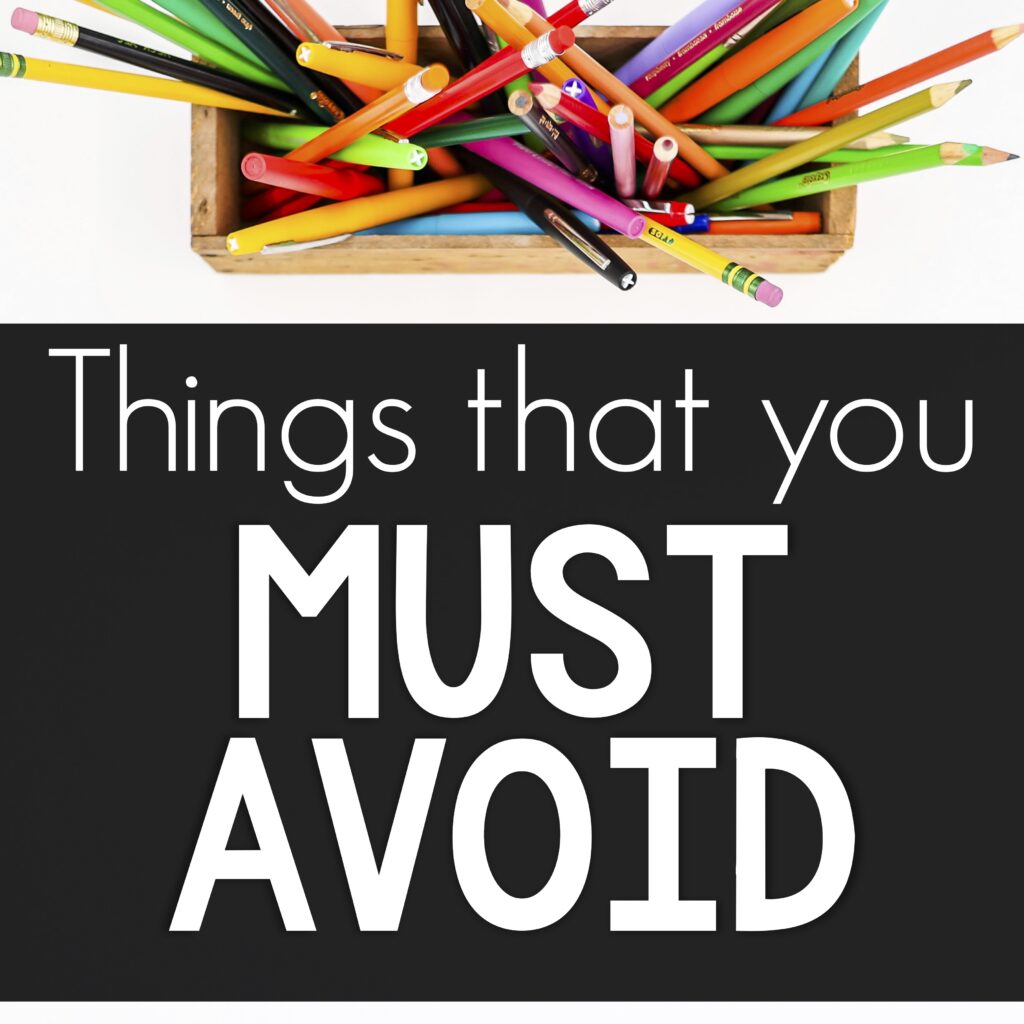
Menu
As a new school year approaches, I’ve been reflecting on my time in the classroom and I felt like writing a post for first-year teachers. First year teachers have all of the normal pressure of a teacher at the beginning of the school year, plus all of the joys and challenges of being a new teacher. It can be difficult to prioritize everything you feel like you have to do.
For me, as a first-year teacher, I walked down the hallways of my building feeling full of excitement and anticipation, and pretty stressed out as well. How could I possibly make my room look as Pinterest-y as the teacher’s next door, plus be as amazing as the teacher who was in my room last year that I keep hearing about, and then on top of it all, be prepared for those 20+ little faces and their families?
To try to help you prioritize everything on your to-do list, I have put together some things that I feel (in my opinion) you must do no matter what, should do to have the best chance at a successful year, could do if you have time or feel up to it, and finally, things that you must avoid.
I taught kindergarten, so my ideas and suggestions are from my kindergarten point-of-view, but I’m sure they apply to most elementary teachers!

Hopefully you’ll have a chance to meet and greet each student and family at Meet the Teacher Night or Back to School Night. In addition to that, you must take the time to make a phone call or at least send a personalized email to each family. This is your way of letting the family know that you are truly interested in working with them to help make their child’s school year a success. Keep the call or email brief, but be sure to ask some questions about their child, listen to any questions or concerns the parent has, and take notes. If they ask you a question that you do not know the answer to, assure them that you will find the answer and call them back ASAP.
In my experience, many parents will want to pick up their child after school on the first day, but on a “normal” day, that same child will go to after-school care, ride the bus, etc. Therefore, know how each child will leave your room after school. For me, this meant I was on the phone with the bus company before the first day of school confirming the bus numbers for my kiddos.
Once you know where everyone is going, make a list and keep it handy. Stick it on a clipboard and carry it around with you. Here’s an editable list from my Kindergarten Back to School Pack that is really handy!

More than likely, the special education teacher, SLP, OT, or whoever the case manager is for those students will meet with you before the school year to give you the details you need to know. Don’t be afraid to ask for this information. If you have students in your room who have IEPs, their parents will likely mention it at back to school night, and it will benefit you greatly to at least know which children have IEPs so you’re not caught off-guard.
We’ve all heard the quote, “A failure to plan is a plan to fail.” It may take some trial and error before you find a lesson planning tool that works for you, and don’t be afraid to ditch something that isn’t working and try something new. Some schools have online lesson planning tools their teachers are required to use. In my district, new teachers could use any lesson plan tool they wanted, and in some buildings, they were required to turn in lesson plans. So, it helps to be prepared. I have done everything from creating my own planning template to purchasing a plan book. Here’s an example of a planning book, and here’s a roundup of popular online lesson planning tools.
Let’s face it – starting a new job is overwhelming in one way or another. No matter how prepared you are, there will be ups and downs throughout the year. I highly suggest making a plan for prioritizing your mental health. Here are a few ideas:

Parents and families are happiest when they are kept in the loop, so keep them happy by sending home general information to all of your students’ families. I always e-mailed a weekly newsletter on Fridays. Some teachers I know sent home a daily update e-mail that included a few things they learned that day, plus any important reminders. You can find lots of editable newsletter templates on TPT!
Don’t be afraid to get a second (or third) opinion on the way you’ve set up your room. Someone else might notice that your guided reading table is in a distracting spot, or that you forgot to hang your alphabet posters. I would highly suggest having your principal walk through so you feel confident that he or she approves of everything in your room from day one. Plus, it shows that you are proactive and that you take pride in your classroom. #browniepoints
One could argue that this belongs in the “must do” category. You really need to have a plan for how you’ll handle everything from fighting to quieting down your class. If all else fails, you can (hopefully) fall back on your school-wide rules until you establish something that works for you. If you don’t have any ideas, check with your grade level team. Starting with consistent classroom management from day one is important for both you and your little learners!

Now is the time for the things that you could do if you really want, but I feel they aren’t 100% necessary to having a successful first year. Again, this is strictly my opinion and it’s subject to change. 🙂
We all want to have an amazing-looking classroom, right? My first year teaching kindergarten, I attempted to have a rainforest-themed room, but I fell short because of all the other demands of teaching and spent the year resenting the way my room looked. So, for the next year, I couldn’t decide what I wanted, so instead of finding something cute, I found something that worked for me. And that was having no theme. (Gasp!) Many teachers pull off having everything perfectly color-coordinated and thematic, and that’s wonderful, but you know what? I loved my second-version classroom so much more. Instead of feeling pressured to have every little station sign and name label match, I only focused more on what’s more important. I had better environmental print, better anchor charts, and my room was overall, way more supportive for my class.
So if it’s your first year and you’re struggling with classroom decor, put it on the back burner for your first year. You can spend next summer working on it instead. And that’s perfectly okay! Remember that there are incredible teachers whose rooms belong on Pinterest, and then there are equally incredible teachers who don’t have anything matchy-matchy.
Now, this is a hard one. Many parents and caregivers want to be able to help with something in the classroom, and it’s a wonderful way to strengthen the home-to-school bond. I always had one parent come to help each day with our guided reading rotation, and it was something I couldn’t do without. However, don’t let this overwhelm you. Begin with having one or two opportunities for parents to volunteer, and maybe have a couple parents who are willing to cut out laminated stuff at home. Check with your grade level team to find out how they manage parent volunteers. Other teachers in your building can help you figure out what the norm is for your building.

Now comes the inevitable time when we talk about what you should must avoid during your first year.
Any time you put together a bunch of women (sorry guys, we love you, too!) and place them in a stressful environment with lots of strong personalities, there’s gonna be some drama. So my advice is, if someone wants to gossip about Mrs. So-and-so, just smile and say, “Shoot, I have to go make copies!” because that’s probably not even a lie.
And there will be LOADS of opportunities for this to happen. Schools need a lot of helpful people to make everything work, and teachers are generous people. So, volunteer to help with some things, but you don’t have to work the carnival, Polar Express night, facilitate a book club, help with student council, AND be a rockstar teacher on top of all that. Focus on what happens between 8:30 and 3:30 in your classroom, and remember that you have a life outside of school and that life is also important.
…especially those with way more experience than you. It’s okay to pick up on little phrases that another teachers uses that you want to try out, and it’s a great idea to ask for coverage to go observe a teacher who has solid guided reading rotations or a really effective math block. Remember that you are still learning and you have significant strengths, too. And if there’s an area that you aren’t too confident with, ask for help. But don’t put yourself down by comparing yourself in a negative way.
So, those are my ideas on how to prioritize some of the things that you will have to juggle this year and every year after it. Are you a first-year teacher? How are you finding ways to prioritize everything? Are you a veteran teacher? What did I miss? Leave me a comment and I might add it to my list!
Feeling overwhelmed with back to school planning? Here are a few resources that might help you out!